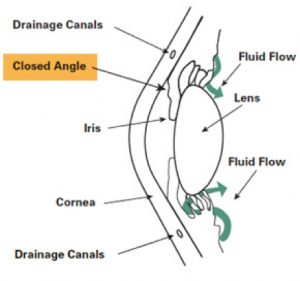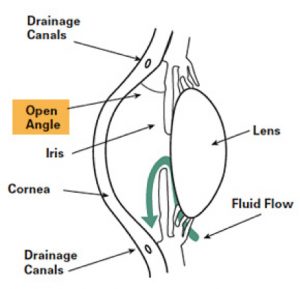Glaucoma Diagnosis and Treatment in Apex and Zebulon, NC
Glaucoma is the second leading cause of blindness in the world according to the World Health Organization. It is a condition that primarily affects adults over the age of 40 but can be found in younger patients as well. The experienced optometrists at NC Eye Associates are committed to providing comprehensive eye examinations that can detect glaucoma in its early stages. With earlier detection comes a better prognosis.
What is Glaucoma?
Glaucoma is a condition that results in progressive damage to the optic nerve (CN II). This damage to the optic nerve manifests symptoms of peripheral vision loss that is not usually recognized by the patient until the disease has reached a severe stage. The optic nerve is responsible for carrying the visual information from the eye to the brain, where vision is processed in the occipital lobe. In most cases, glaucoma is slowly progressive and is a result of high intraocular pressure inside the eye that leads to decreased perfusion of blood flow to the nerve head. Some common risk factors include a family history of glaucoma and thin corneas. Glaucoma is also more common among African-Americans. Although it’s less common, trauma, narrow angles (drainage area of the eye), pigmentary build-up, and inflammation can cause glaucoma.
Types of Glaucoma
There are many different types of glaucoma. Here are a few that we treat at NC Eye Associates:
Open-Angle Glaucoma
This is the most common type of glaucoma. The drainage structures of the eye appear normal, but the IOP (intraocular pressure) remains high and nerve damage is present. This high IOP occurs due to either too much fluid production, too little fluid drainage or a combination of the two. Most patients with this type of glaucoma will not notice any symptoms of their condition until it reaches a severe stage due to the slow progression over time.
Congenital Glaucoma
This type of glaucoma is hereditary and is present at birth. It is caused by abnormal development of how fluid exits the eye. It can be associated with other systemic developmental abnormalities as well. It typically affects children with large eyes and they may present with light sensitivity, cloudy appearance to their corneas and/or excessive tearing.
Pigmentary Glaucoma
This type of glaucoma is caused by pigment that breaks loose from the posterior surface of the iris and clogs the eye’s drainage canal resulting in increased IOP. It’s rare, but patients with pigmentary dispersion syndrome have approximately a 30% risk of developing this type of glaucoma. Patients with pigmentary dispersion syndrome may experience blurry vision for about 1hr after strenuous physical activity.
Narrow-Angle Glaucoma
This is a less common, more acute, type of glaucoma where the eye doesn’t drain fluid properly due to a narrow drainage canal. This develops very quickly due when the drainage canal becomes blocked. It causes a sudden build-up of pressure in the eye and is linked to cataracts and farsightedness. This type of glaucoma is sometimes referred to as chronic angle-closure or angle closure glaucoma.
Glaucoma Symptoms and Detection
In its early to moderate stages, most glaucoma typically presents with little to no symptoms. Therefore, regular eye exams are very important to identify the condition in its earliest stages. Without treatment, peripheral vision loss can begin to develop without you even knowing it. An eye care professional can detect glaucoma with many different diagnostic tests used during an annual comprehensive exam.
Treating Glaucoma
Treating glaucoma largely depends on how early it is detected and the type. Most patients diagnosed with glaucoma can manage it with eye drops, while more serious cases require surgery. Our eye care professionals work closely with trusted and experienced surgeons to determine the best course of action for treating glaucoma if surgical intervention is necessary.
Eye Drops
If you are diagnosed with glaucoma in its early stages, it can be managed with prescription eye drops to control the flow of fluid in and out of your eye.
Laser Eye Surgery
Laser eye surgeries can help increase the flow of fluid out of the eye. It can also help remove blockages in the drainage canal.
Micro-Invasive Glaucoma Surgery (MIGS)
This surgical procedure involves creating a new channel for fluid to drain from your eye. In many cases, this type of procedure can be completed during cataract surgery, and many patients can use this as a replacement for their topical therapy.
Contact the Eye Care Professionals at NC Eye Associates for an Eye Exam
Diagnosing glaucoma in its early stages is the best way to prevent complications. By scheduling routine eye exams, you will reduce your chances of experiencing vision loss due to glaucoma.
The optometrists at NC Eye Associates offer whole-health eye care services that include screening and monitoring glaucoma and co-management with a glaucoma specialist when required.
Request an appointment with NC Eye Associates at our Apex or Zebulon, NC location for high-quality glaucoma management using the latest technology available in eye care.



